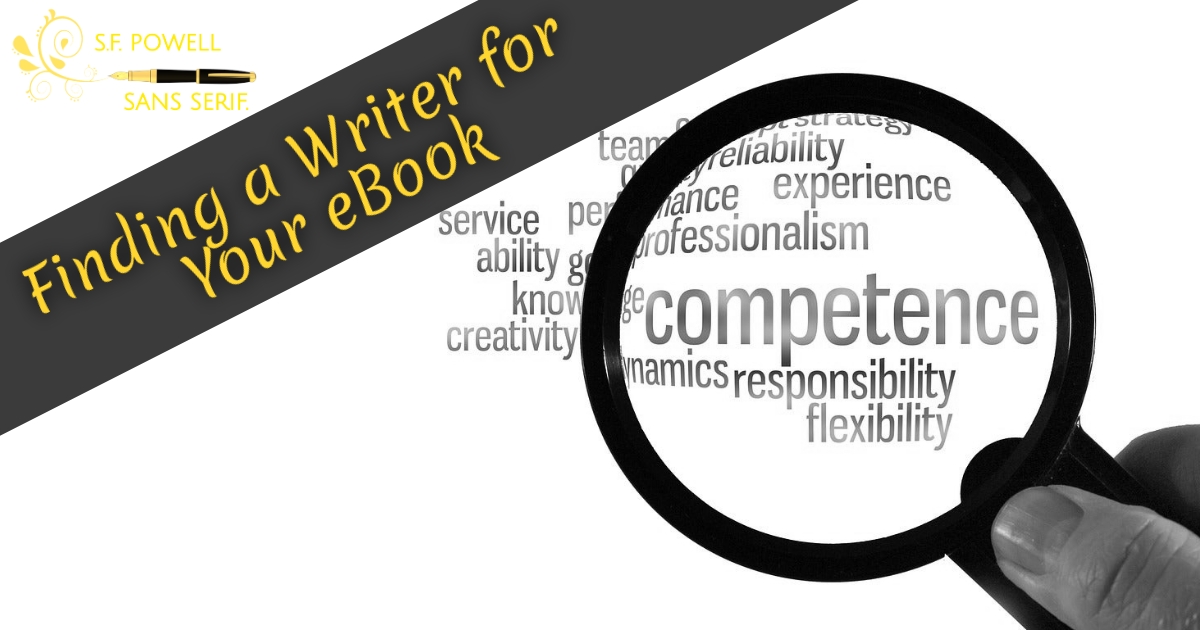Recently, I reviewed considerations for traditional publishing once that manuscript is ready for the world. I’m shifting focus slightly to discuss e-books and outsourcing their creation.
The term “e-book” is self-explanatory: an electronic version of a book. They’re distributed in electronic formats and made available to readers via the internet. You likely have an e-book or five stored on your device storage or in your “cloud.” Most think of novels when it comes to e-books, but informational e-books are prominent. Informational e-books provide pertinent content within some niche and range from a few to hundreds of pages.
If your e-book is less than fifteen pages, you likely don’t need a ghostwriter. But for extensive material, where you have expertise in a particular niche, but “writing” isn’t your bailiwick, hiring someone who resides at “101 Solid Writers Lane in Writersville, USA,” is a better option.
Before the Search
Ultimately, a professional writer is responsible for writing the full draft and final version of your e-book, as well as revisions based on any niche marketing recommendations.
So, what’s involved with outsourcing an e-book?
First, determine the project scope. Will this be a series of e-books or all the marbles in one huge volume? Are you including numerous links, graphics, or videos? How much research or input from SMEs will be necessary? Answering these questions help define the project’s size. Not that the scope can’t change (because it probably will). But knowing the level of effort involved helps determine whether writing the e-book is worth pursuing.
Money & “Passion” Considerations
With the e-book scope determined, is hiring a professional writer is within budget? Consider:
-
-
- the e-book’s length
- the number of graphics involved
- the writer’s level of experience
- other factors (including the demand/popularity of your niche)
-
Costs can escalate quickly. And don’t get too hung up on the writer’s “pedigree.” Saving a few hundred dollars by going with a less-seasoned writer, may work out for the better. A budget and knowledge of the going rate for professional writers, provides certain negotiation parameters.
Next, research those similarly passionate about your niche subject. Because passion doesn’t necessarily equate with talent, passion alone won’t qualify them to write your e-book, but it’s a good starting point. Even if they aren’t hired for the job, you may want them involved with outlining the e-book, or contribute to final edits. Utilize social media and professional organizations related to your subject as resources for “similar passion for niche” research.
Finding the Right Writer
So, the scope and budget are set. Excitement abounds from doing your “passion for niche” research. With everything looking feasible and promising, you’ve decided to outsource your e-book. Begin the selection process by considering and prioritizing key decision-making criteria:
-
-
-
-
- Writer’s niche experience
- Cost
- Review of writing samples (strengths and style)
-
-
-
For example, if price is priority #1 followed by solid writing samples, and lastly, niche experience, you’d more readily consider hiring the less-skillful but lower-fee writer.
The search for writing candidates can be local to global. Conduct a local search with advertisements in local newspapers or trade magazines. A global search involves visiting websites with profiles and lists of writers wishing to outsource work. Social-but-professional sites like LinkedIn are ideal for narrowing-down your short list. Whether local or global, your “Writer Wanted” ad/proposal should request pertinent information you want potential candidates to provide.
Narrowing Things Down
Expect multiple responses to your ad. Evaluate and eliminate the on-sight duds, keeping your prioritized criteria in mind. Even if writing strength isn’t your highest priority, poor writing samples aren’t worth even the most affordable price (it may be why they’re so affordable). Rank the remaining applicants using your prioritized list of criteria. Take your time. Review, compare, contrast … until you’re down to three writers worth pursuing.
Beyond the Résumé
Now, it all sounds good on paper, but a picture (and voice) speaks a thousand words. The interview process is important for learning whether project expectations can/will be met. Conduct interviews in person, via telephone, or online. Sometimes the impression on paper contradicts the person-to-person vibe. A bad interview destroys any desire to work with said writer for one day, let alone several months.
Iron-out things like number of revision-runs, payment process, and scheduling to see how everything will (or won’t) fit the timeline. Working with a writer meeting both on-paper and in-person facets is best for establishing a solid working relationship. And, it’ll be a pain, but if the interview process doesn’t go well, start from the beginning.
Okay, you’ve researched, reviewed, compared, contrasted, and interviewed beyond a capacity you thought humanly possible. Now, it’s decision-making time …
Go ahead. Take a breath and feel good about it. This is the moment you’ve worked (and worried) over.
Until next time, stay serif.






0 Comments